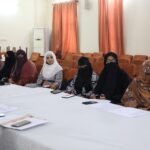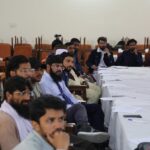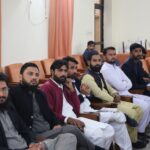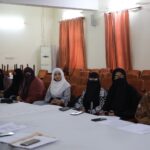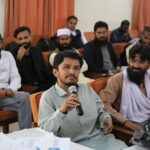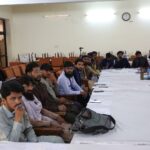Intolerance and Extremism Hinder Peaceful Coexistence in Pakistan
Pak Institute for Peace Studies (PIPS) organized a two-day national workshop titled “Building Bridges: Fostering Tolerance and Inclusivity among Youth” on February 11-12, 2025, at Bahauddin Zakariya University in Multan.
In the inaugural session, Muhammad Murtaza, Project Manager at PIPS, outlined the purpose of the workshop, emphasizing the need for tolerance and inclusivity among youth. He noted that despite Pakistan’s multicultural, multi-ethnic, and multi-religious society, a lack of tolerance hampers peaceful coexistence. He also discussed the challenges posed by the country’s youth bulge, as a significant portion of Pakistan’s population consists of young people. Economic difficulties have led to shrinking employment opportunities, fostering a sense of hopelessness among the youths that extremists often exploit. He further highlighted the transformative impact of social media on daily life, acknowledging its benefits while cautioning against its challenges. He urged young people to respond thoughtfully to different situations on social media rather than reacting impulsively. Additionally, he stressed the importance of engaging with individuals from diverse backgrounds to gain a broader understanding of perspectives, rather than forming opinions based on prejudice.
The second session, titled ‘Constitution, Parliament, and Citizenship,’ was led by senior journalist Imran Mukhtar. He elaborated on the fundamental rights enshrined in the constitution and explained the functions of parliamentary democracy. Engaging with the participants, he assessed their existing knowledge of Pakistan’s parliamentary system. He also provided insights into the workings of parliamentary committees and the oversight roles of the three constitutional pillars. Additionally, he emphasized the importance of fostering a sense of ownership and actively participating in civic practices.
Professor Zia ur Rehman, Chairman of the Department of Qur’ānic Studies at the Islamia University of Bahawalpur, participated in a panel discussion where he spoke about ‘Paigham-i-Pakistan’ – an Islamic decree that serves as a national narrative to counter extremism and terrorism in Pakistan. “The use of violence against the state, increasing sectarianism, the trend of declaring others as infidels, and the wrong interpretation of jihad were among the key factors that led to the introduction of this document,” he highlighted. He also attributed the rise of extremism and intolerance in the country over the past decade to social media. He emphasized that individuals often misinterpret Hadiths, leading them to take actions that should be the state’s prerogative, not their own. The core issue in Pakistan, he noted, is the widespread misunderstanding of this principle, which has fostered a climate of tension and intolerance. He stressed the need for a more open-minded approach to interpreting religious scripture.
Professor Altaf Hussain Langrial, Director of the Institute of Islamic Studies at BZU, said that efforts like Paigham-i-Pakistan to counter extremism couldn’t succeed unless people, especially the oppressed and vulnerable segments of society, were given an opportunity for dialogue. He noted that student unions could also provide youth with a platform to express their sentiments and discourage the growing trend of extremism among them. He was of the opinion that diversity is the beauty of life. “If we look around, vibrant surroundings foster a sense of peace. The same principle applies to our lives—we should learn to embrace our differences,” he observed.

Professor Abdul Quddus Suhaib, Director of the Islamic Research Centre at BZU, said that tolerance ensures equal rights for all people in a society to live according to their own faiths and religions. “Tolerance means granting equal independence and respect to every sect and faith,” he said, adding that Islam provides equal rights in this context. He observed that our society has confined religious scripture to a narrow perspective, leading to redundant debates instead of meaningful, constructive discussions. The focus should be on fostering a harmonious society, as Islam empowers individuals from all backgrounds to flourish and practice their beliefs without fear of persecution. To counter intolerance in Pakistani society, a shift in mindset is essential, along with a more proactive approach to promoting inclusivity and mutual respect.
Political activist and lawyer Dileep Kumar in his session said culture encompassed shared values, beliefs, customs and languages of people living in a society. “The trend of living in an inclusive society will ultimately resolve all our conflicts,” he said, emphasizing the need for a curriculum that reflects the diversity of all communities and faiths in Pakistan. Engaging the participants, he asked about the languages spoken across the country. He asserted that the constitution grants equal opportunities to all citizens, and this principle should be acknowledged and upheld by society.
Columnist and blogger Farnood Alam underlined that ‘uniformity’ was a negation of ‘diversity’ and a negative term, under which any community or ethnicity had to surrender its ‘separate identity’ before a ‘specific identity’ to serve interests of a certain segment of society. “It is the banner of ‘unity’ under which people with different faiths, ethnicities and languages can sit together under one roof based on some common grounds. The basic needs of life and fundamental rights can be among these common grounds. He also cautioned participants to use social media with
In the concluding session, PIPS President Muhammad Amir Rana explained that inclusivity involved providing equal opportunities in education and employment, as well as ensuring civil liberties for all citizens. Inclusivity is a process of bringing about inner change at the individual level, and it is an antidote to anger. He highlighted the contemporary challenges as societies across the world go through transitions at the same time. The effects of transition are transnational, and generations have witnessed the structures of our societies in this manner.
He argued that global conflicts arise primarily from differences in worldviews. Emphasizing the importance of broadening perspectives, he encouraged youth to develop a deeper understanding of the world to make informed decisions that support their personal growth and progress. Additionally, he urged them to engage with individuals from diverse faiths, ethnicities, and nationalities, fostering both personal development and a mindset of acceptance.



